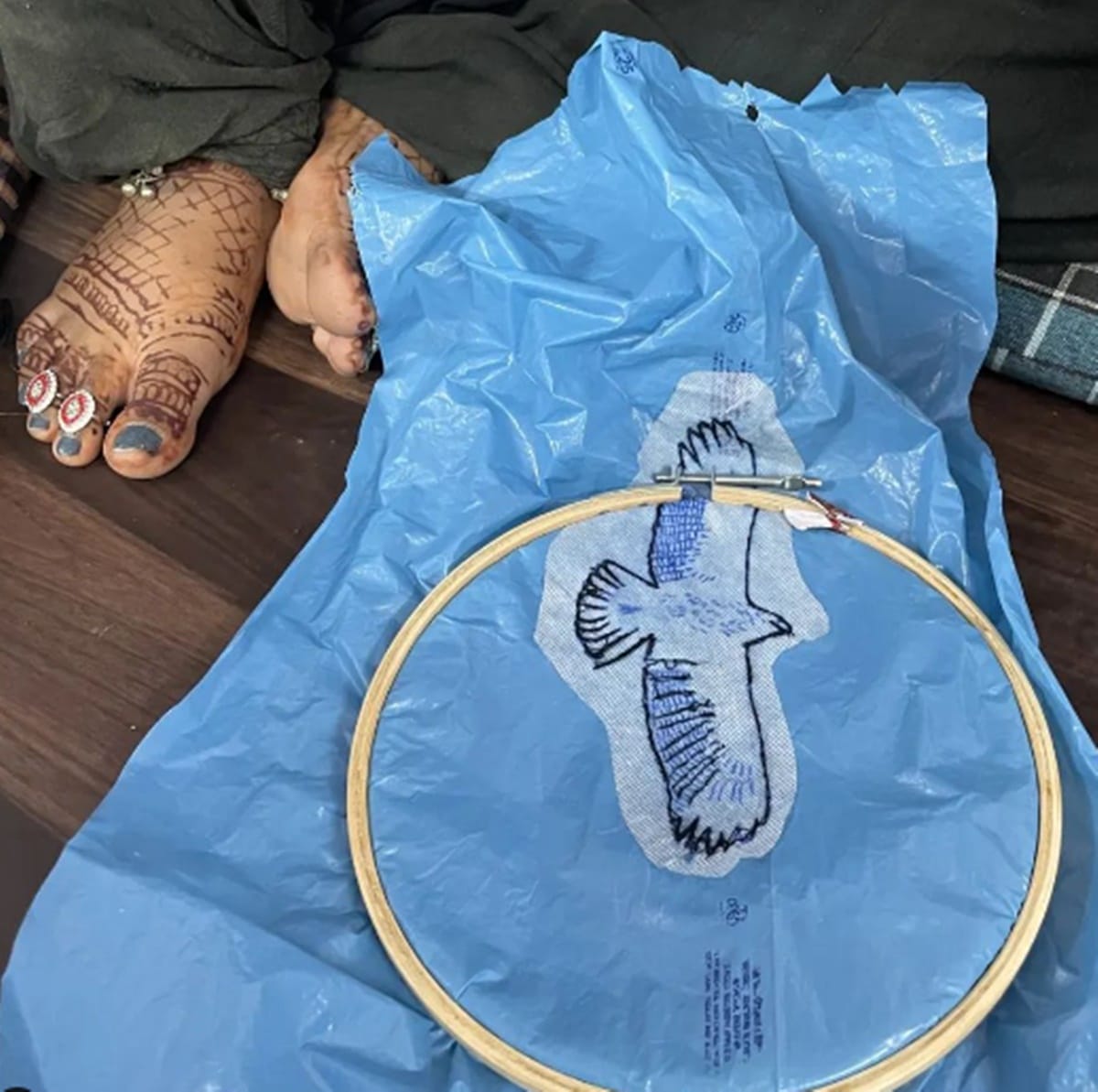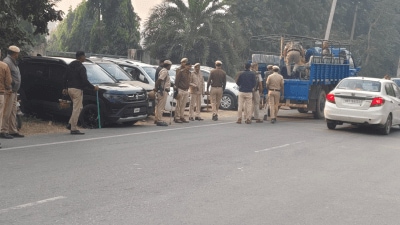The crisis of climate change is real and artists have taken to various mediums to express the challenges and threats it poses to people, communities, and plant and animal species across the world.
For French artist Anaïs Beaulieu, it was embroidery as she tried to connect the dots with the larger idea of conversing with communities who are at the receiving end of such a crisis like the fishing communities of Karumkulam in Kerala’s Thiruvananthapuram. Through embroidery on plastic bags, typically used for collecting waste, Beaulieu, 44, taught the women of these fishing communities to illustrate the world around them, one stitch at a time.

In an exclusive interaction with indianexpress.com, the Montreuil native said, “Embroidery is my way of expression. It helps me to digest what I perceive as difficult around me. It helps me to find a way to transform it as an alchemist would do”.
Story continues below this ad
“Embroidery is not a painting or drawing. It is supposed to be a craft. And everybody would have seen someone around her do it. So, there’s a kind of accessibility in it. It’s also a way to symbolise a link. It’s a way to enable something which can be not very beautiful – a waste,” she added.
 Here’s some embroidery on plastic (Source: Threatened Species Threatened Spaces/Instagram)
Here’s some embroidery on plastic (Source: Threatened Species Threatened Spaces/Instagram)
An act of revenge
Beaulieu learned embroidery from her grandmother, a craft that she said women in her family learned through generations. However, it was not until she took a trip to West Africa’s Burkina Faso nine years ago and saw a field choked with plastic bags in a village that she again took up embroidery.
“Embroidering plants on these plastic bags seemed like revenge. Piercing them with a needle always brings a little tension because the plastic can tear at any time. It’s a way to make it vulnerable, like the plant species embroidered on it,” she said.
Story continues below this ad
“It took me about 900 hours to complete the embroideries for this entire series. It only takes half a second to throw a plastic bag on the ground that will take perhaps 400 years to degrade. Have you ever wondered how long a species takes to be born and to die out?” asked Beaulieu.
After starting to embroider on these plastic bags, she met Gita Wolf from Tara Publishing, an Indian publishing house based in Chennai. It allowed her to come to India for the first time in 2018 with support from the French Institute. “When I explained and showed her these embroidered plastic bags that I began in Burkina Faso, she responded to me saying ‘We have the same problem here, let’s do a book’”.
Based on the theme, her book, A Stitch Out of Time, was published by Tara Books in 2022. “The book plays with two powerful themes: environmental degradation symbolised by the ubiquitous take-over of our surroundings by plastic, and the slow time of creation, whether it is a tree, or a piece of embroidery,” according to the independent publisher.
The artist could then meet Sanjana Sarkar from Alliance Française in Jaipur and join hands for the ongoing Threatened Species Threatened Spaces project. The travelling project, which started in August when it came to India, includes panel discussions, workshops, and art exhibitions in a few places in the country.
Story continues below this ad
 Embroidery on plastic as part of the workshop (Source: Threatened Species Threatened Spaces/Instagram)
Embroidery on plastic as part of the workshop (Source: Threatened Species Threatened Spaces/Instagram)
A whale of a story
Beaulieu said they are working with the Coastal Students Cultural Forum (CSCF), an organisation that promotes and defends the cultural aspects of the coastal community, for this part of the project.
“CSCF has been working in the coastal parts of Southern Kerala for the past few years with the motive of bringing more coastal youth to higher education, highlighting the indigenous rights of traditional, artisanal fishermen of the state, and reducing the backwardness of the coastal community in the social, economic, cultural and educational sectors,” she added.
A brainstorming session with the participants eventually helped them zero in on the Humpback whale (Megaptera novaeangliae), the biggest mammal in the world, as the logo for the project. The participants then started embroidering the Humpback whale.
Story continues below this ad
“A creature that has been immortalised in the ballads and poetry of seafaring folks. One that finds new homes in newer territories, a symbol of international migration. Of course, this one is not endemic to India, but for the fisherfolk community of Kerala, it’s emblematic of the protection it brings to them in their daily lives. It’s almost the reigning deity of the fishing community in the region,” said Beaulieu on the cultural significance of picking up the species.
Dialogue for social change
That a workshop can make a difference to the ecology, and the thought process of the people living in such communities is evident, asserted Beaulieu.
“Some participants told me that when they came back home on the first day (of the workshop) and they explained to their families what they would do, they didn’t understand. ‘Why embroider on plastic? How does it make sense?’ were some of the questions. But after, they started to do it, and showed it to their families…it started to change their opinion,” she said.
“One recalled how her family used to throw plastic on the beach but because of the workshop, and especially because we had embroidered the endangered species, it helped her gain consciousness on caring for our surroundings.”
Story continues below this ad
The travelling workshop, currently in Delhi and will go to Pune and Jaipur in the following weeks, will have such endangered species logos to convey the message of less use of plastics.
“All projects are collaborative with social responsibility and social work communities and an attempt to build art as a form of dialogue for social change, especially with respect to the environment,” Beaulieu shared.
📣 For more lifestyle news, follow us on Instagram | Twitter | Facebook and don’t miss out on the latest updates!



 Here’s some embroidery on plastic (Source: Threatened Species Threatened Spaces/Instagram)
Here’s some embroidery on plastic (Source: Threatened Species Threatened Spaces/Instagram) Embroidery on plastic as part of the workshop (Source: Threatened Species Threatened Spaces/Instagram)
Embroidery on plastic as part of the workshop (Source: Threatened Species Threatened Spaces/Instagram)

























